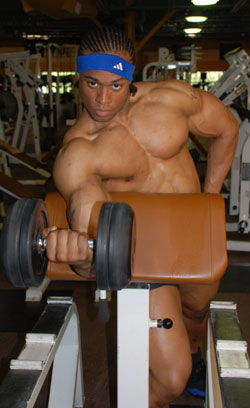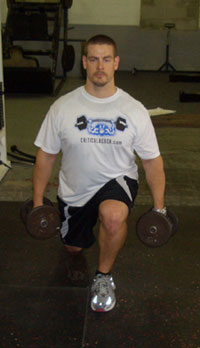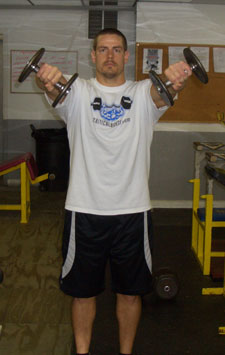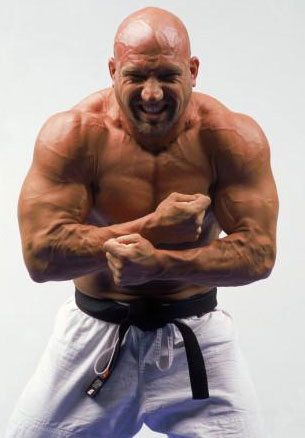|
Supersets - What They Are, Why They Work, and Several Unique Variations You Can Try In Your Next Workout
 The Superset is a very simple concept...basically, you just do two exercises back-to-back, with no rest inbetween! A quick example of this is doing a barbell curl then going directly into a cable curl.
The Superset is a very simple concept...basically, you just do two exercises back-to-back, with no rest inbetween! A quick example of this is doing a barbell curl then going directly into a cable curl.
Sound simple? It definitely is. But there are many different combinations and ways to use the Superset to make it an incredibly powerful training technique.
Before I get into specific combinations, you need to know what, generally speaking, makes a Superset more effective than two regular sets done with rest inbetween. There are three major reasons why Supersets are so effective for training (and there are many more specific reasons that apply only to specific Superset types):
1. Supersets increase Lactic Acid production, which helps boost Growth Hormone (GH) levels in the body. The body responds to the reduced pH (increased acidity) in the body from the production of Lactic Acid by secreting GH. GH is a powerful fat loss and muscle building hormone.
2. Supersets are time-efficient. By doing sets back-to-back, you reduce your total workout time while still doing the same amount of total work. If you're in a hurry in your workout, Supersets can get you out of the gym faster.
3. Different Superset combinations can help increase muscle fiber activation. Essentially, this means you can use specific exercise combinations to increase the intensity of work on a specific muscle, helping to develop it faster.
As I mentioned above, there are many different types of Supersets that fall under the Superset umbrella. I will go through these different types, telling you exactly why they're so effective and giving examples of each that you can take to the gym and try out for yourself!
Keep in mind when you're doing these, they are intensity techniques and should not be used every day. Your body needs a chance to recover and using these techniques too often can hamper recovery. My suggestion would be to do workout supersets no more than once a week for any particular bodypart.
1. The Single Bodypart Superset
This is the typical type of Superset where you use two different exercises for the same bodypart. An example of this doing a pulldown for the back then immediately doing a seated cable row for the back.
The benefit of this is to hit somewhat different fibers of the muscle from different angles but without giving the bodypart time to recover from the first exercise. This forces the bodypart to work that much harder to complete the second exercise.
It's a powerful increase in intensity and one that can dramatically ramp up muscle development.
Here are some examples for other bodyparts:
 Chest:
Chest:
flat barbell bench press + incline dumbell press
incline flyes + flat dumbell bench press
cable crossovers + push-ups
Thighs:
squats + leg extensions
leg press + lunges
Shoulders:
side lateral raises + rear lateral raises
dumbell shoulder press + barbell shoulder press
2. Antagonistic Supersets
Instead of doing two sets in a row for the same muscle, you will do two sets for directly opposing (antagonistic) muscle groups. An example of this is doing a bicep exercise then a tricep exercise.
Antagonistic Supersets are excellent for allowing you to compress workout time while maintaining high strength levels. When you work an opposing muscle group directly after the original muscle, studies have shown that the nervous system activation can actually INCREASE strength in the second muscle group when you work it.
Here are some examples of Antagonistic Supersets:
Chest & Back
flat barbell bench press + bent-over barbell rows
Biceps & Triceps
barbell curls + close grip bench press
Quadriceps & Hamstrings
leg extensions + leg curls
The shoulders don't technically have any direct antagonist muscle groups, but you can work with the specific shoulder exercise movements to do the opposite movement. For example, you can do dumbell shoulder press then go directly into pulldowns for the back. You can also do rear delt lateral then dumbell flyes.
The antagonist muscle to the two major calf muscles is called the tibialis anterior. It's a small and relatively weak muscle compared to the major calf muscles (the gastrocnemius and the soleus) and not particularly useful for doing Supersets with.
3. Pre-Exhaust Supersets
This type of Superset focuses on first utilizing an isolation (single joint) movement to "pre-exhaust" the target muscle group before doing a compound (multi-joint) movement to allow the secondary mover muscles to push the target muscle harder.
In English, that means you start with an exercise that works just the target muscle, such as a dumbell flye. When you're done, you use an exercise that works the target muscle with help from other muscles, e.g. the bench press.
The net result is that you first exhaust the pecs with the flyes. When you move to the bench press, the pecs get help from the triceps and shoulders to help keep moving the weight, pushing the pecs much harder than they would normally have to work when doing the bench press.
 The result of this is much faster muscle development!
The result of this is much faster muscle development!
Here are some other examples of
Pre-Exhaust Supersets:
Shoulders:
dumbell side lateral raises + dumbell shoulder press
Triceps:
pushdowns + dips (bench or parallel bar)
Thighs:
leg extensions + squats
Biceps:
barbell curls + close grip pulldowns with the torso vertical
4. Giant Sets
The Giant Set is another very simple concept. Instead of doing just two sets for a Superset, you do three or more sets in a row for that bodypart using different exercises!
Giant Sets are generally done just targeting a single bodypart. They are very intense and shouldn't be used too often. The goal with the Giant Set is to really shock the muscles, forcing the body to activate many more muscle fibers than it normally would to perform these exercises.
In fact, you can even use the same exercise twice in a Giant Set to really shock your muscles!
Here are some examples of Giant Sets:
Chest:
incline barbell bench press + flat bench press + decline bench press
Back:
chin-ups + wide-grip pulldowns + seated cable rows + hyperextensions
Thighs:
squats + leg extensions + leg press
Hamstrings (here's a case where you can use the same exercise twice
in the Giant set): leg curls + stiff-legged-deadlifts + leg curls
Some Giant Set combinations are not as practical, however. For example, if you do a Giant Set for back, you may not have the back strength (or grip strength) to finish with chin-ups.
5. In-Set Supersets
This is a unique type of Superset where you basically mesh two different exercises into a single set. There are a number of very effective variations of this that are EXTREMELY challenging, including one of my very favorite techniques for building powerful triceps.
In a nutshell, you will do one rep of one exercise then one rep of a different exercise, alternating reps until you can no longer do any reps of the weaker exercise. At that point, you finish with as many reps as you can do of the stronger exercise. It's a very intense technique!
This type of Superset maximizes training intensity and allows you to work several different aspects of the muscle at the same time, dramatically increasing workout efficiency.
 Here are some examples of the In-Set Superset:
Here are some examples of the In-Set Superset:
Chest:
dumbell flyes + dumbell bench press
Back:
barbell rows + deadlifts
Biceps:
regular dumbell curls + hammer curls
My All-Time Favorite For Triceps: lying barbell extensions + close grip bench press
Finish by doing as many close grip bench presses as you can!
BONUS
A Unique 3-Bodypart Combination - Biceps, Shoulders then Triceps:
Start with one dumbell at a time the first time you try this. The coordination can be tricky. The weight you use for each of the three exercises is similar enough to make this a very effective and timesaving combination.
Begin with a regular dumbell curl. At the top of the curl, you then perform an Arnold Press for your shoulder (where you start with the dumbell in front of you in a top-of-curl position, then swing your elbow out to the side as you press up - your hand ends up facing forward). At the top of the press, immediately go into an overhead dumbell extension.
Reverse the order to bring the dumbell back down to the start position: extend the arm to the top of the tricep extension, perform the lowering phase of the Arnold Press to the top of the curl position, then lower the weight doing the down-phase of the curl.
When you are comfortable with the execution, you can move to doing both dumbells are the same time. For an extra challenge and test of your skill and coordination (or simply for your friends to have a good laugh), try doing this exercise reverse-alternating.
What that means is while you are curling up your right dumbell, you are performing an overhead tricep extension with the left dumbell. Then, as you do an upwards Arnold Press with the right dumbell, you are doing the lowering phase of the Arnold Press with the left dumbell. Then, as you are doing the lowering phase of the Overhead Tricep Extension with the right, you are lowering the curl with the left.
When it comes right down to it, Supersets are a VERY effective training technique. Give one of these Superset methods a try in your next workout. You'll be amazed at how powerfully they crank up the intensity of your training!

More Articles by Author Nick Nilsson
Return To Weight Lifting Articles Archive
|